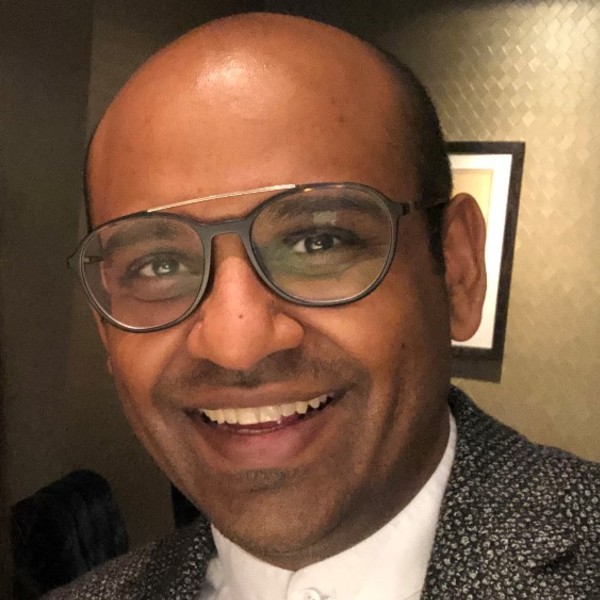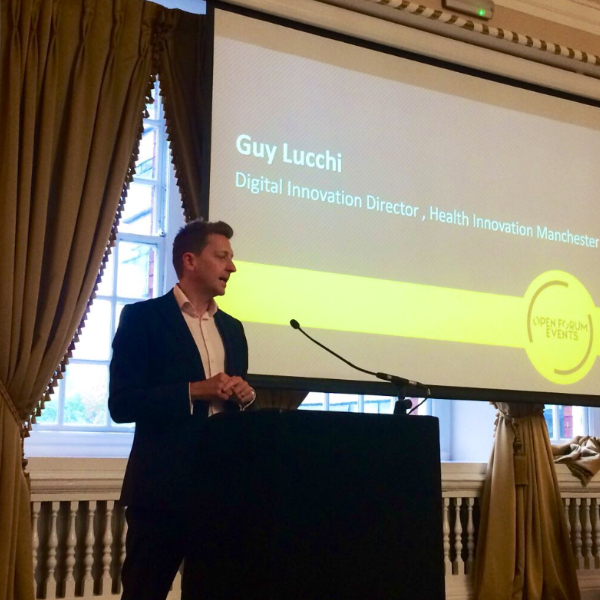This website uses cookies so that we can provide you with the best user experience possible. Cookie information is stored in your browser and performs functions such as recognising you when you return to our website and helping our team to understand which sections of the website you find most interesting and useful.
21 Sep 2020
How Greater Manchester is making a difference in the national COVID-19 research efforts: Interview with Professor Andy Ustianowski and Sarah Fallon from NIHR CRN GM

Phrases such as “research studies” and “vaccine trials” would not have been heard on a regular basis in many living rooms around the country at the start of 2020. But fast-forward several months and the COVID-19 pandemic has brought the importance of research to the forefront of everyone’s minds with the search for effective coronavirus treatments and a vaccine.
In this time the excellent researchers across Greater Manchester pivoted their work to focus on the challenges of COVID-19, setting up trials, recruiting participants and leading national public health work.
In this interview, Sarah Fallon, Chief Operating Officer of NIHR Clinical Research Network (CRN) Greater Manchester, and Professor Andy Ustianowski, Consultant in Infectious Diseases & Tropical Medicine and NIHR Joint National Infection Specialty Lead, discuss the importance of clinical research and how COVID-19 has led to challenges but also new ways of working.
Andy Ustianowski (AU): “Over the last five years we’ve recruited about 250,000 people to health and care research studies. And the reason for that is really the connectivity we have. We’re a joined-up community and we’re helped by Devolution Manchester. We have good working relationships between the CRN, and all the other organisations that are involved in research – all NHS Trusts around Greater Manchester are actively involved in research and recruiting people. We could not do any of this without that collaboration and that’s, I think, the key to our successes.”
Sarah Fallon (SF): “We work closely with our research active NHS Trusts, primary care, social care organisations. We talk to each other, support each other and have a clear ambition to deliver health and social care opportunities to Greater Manchester communities together. That means sharing initiatives to improve participation experience but also things that allow us to be inclusive across the region.”
Why are research studies so important in supporting the health and care of citizens?
AU: “Clinical Research is vital. Everything that we do in medicine should be based on evidence, and we only get evidence from clinical trials. You can have good thoughts, good guesses and good hunches about what works, but actually that can be wrong as often as it is right. What you really need to do is perform proper clinical studies, not just on medicines themselves but on procedures, on diagnostics, on everything we do in health care. If we want ourselves and our families to be healthier and our health systems work better the only way is by doing research and then using the findings of clinical research into clinical practice.
“If we take COVID as an example. Only a few months ago we had a new disease but no recognised treatments only a lot of thoughts and ideas. Now we know that fairly simple treatments such as steroids dexamethasone or hydrocortisone have an effect on the mortality. We know certain antivirals are efficacious at decreasing the length of the illness. We only know this because we’ve done studies.”
SF: “We are always grateful to everyone who considers taking part in research in Greater Manchester. Clinical trials are a really important choice for participants. But nobody is ever forced to take part in a study. The CRN support researchers to offer citizens the opportunity to be part of research, some of those choices include clinical trials of drugs or devices. We make sure people are fully informed of what is going to happen and ensure they are supported by trained members of staff within that organisation. Some people hear the information and decide it’s not for them, but it’s important that they have the information to be able make the choice that’s right for them.”
What COVID-19 research have you been taking part in?
AU: “Personally, I’ve been involved with COVID research in a variety of ways and at a variety of levels and it is very rewarding.
“Locally, our unit has been very active in recruiting patients to some of the studies. Regionally and nationally we’ve been principal investigators but also chief investigators for some of the pivotal studies that have come through on antivirals and certain other agents. Nationally, I’ve also had the opportunity of being part of the new Urgent Public Health Committee, which has been triaging and been assessing studies for those that are most likely to give us the answers in a timely fashion. That’s been a very interesting and useful process.
“I’ve also got a national role, trying to coordinate some of the COVID vaccines that are coming around the country including into Greater Manchester. That’s an even bigger challenge, but one I think that is definitely worthwhile. If we want to get out of lockdown if we want to get the economy back on track one way we can do that is a vaccine, so however much effort it takes, it’s going to be worthwhile.”
How has research been affected by COVID-19 and what have been the challenges?
SF: “For us, a lot of non-COVID related research was paused, so that our researchers could focus on the urgent public health research prioritised by the government. We had a fantastic effort to deliver those studies and over 10,000 participants were recruited from Greater Manchester into COVID research studies. We also saw a lot of our clinical staff redeployed to the frontline, or supporting research teams across GM with Urgent Public Health and providing research leadership in the NHS Nightingale Hospital North West.
The GM Study Support Service also reacted effectively to COVID-19 providing a 7-day service, to ensure that we could expedited study set up.
“We’re so proud of everybody’s contribution in everything that they did in responding COVID and the CRN:GM Comms team has taken to social media to both engage GPs in taking part in research, and to thank our patients for taking part in research studies. These videos have been viewed collectively, nearly 5000 times. A further video thanking local R&D teams, delivery staff and support services will be released to mark ICTD 2020.
AU: “As part of COVID we’ve had new challenges as well. We’ve got several possible COVID vaccines coming through the pipeline that need research to see whether they’re going to be good for our population. This is large scale and we’re looking at enrolling thousands of people around Greater Manchester and tens of thousands of people around the country. We’ve had to break down traditional mindsets and barriers to look at how we can deliver this research in a reasonable timescale to give us the products and the results that we need.
“Also, a lot of studies were paused or changed because of COVID. We’re in a stage of restarting these. This is done on a case by case basis or site by site basis, but it’s really important that COVID doesn’t take over everything. We still need to carry on the research into cancer, cardiovascular disease, renal disease everything else. It does take a bit of juggling – we can’t do everything we want all the time – but we’ve got processes that we’re following to try and make sure that research in all areas continues as much as we possibly can.”
What have you learned during the pandemic?
AU: “There have been challenges associated with COVID, but there are also new ways of doing things that I think are better and that we can take forwards. National prioritisation processes mean a lot of the red tape has been cut out so things that might have taken months from conception to first patients being enrolled is now taking sometimes two weeks. It is completely different but it doesn’t mean we’re cutting the corners and the actual research – it’s the red tape that’s around it. And I think that’s something that if we can carry on in the future will be of huge benefits.”
SF: “I think a key learning from COVID-19 has been that we’ve proved we can work differently and at speed when faced with a global emergency. And certainly, we have seen an increase in the public’s research awareness. Having the Chief Medical Officer and the Prime Minister talking about the importance of research and how research has a place in combatting in COVID-19 has generated many more conversations about research in living rooms around the country. And I think another benefit has been the number of new care professionals that have been exposed to the research taking place in their local services. We hope that it will encourage more people to consider getting involved with research.”
Professor Andy Ustianowski is also Deputy Clinical Director, NIHR Greater Manchester Clinical Research Network, Principal Research Lead, North Manchester General Hospital and MAHSC Honorary Clinical Chair, Faculty of Biology, Medicine & Health, University of Manchester.
Find out more about NIHR CRN Greater Manchester https://local.nihr.ac.uk/lcrn/greater-manchester/




